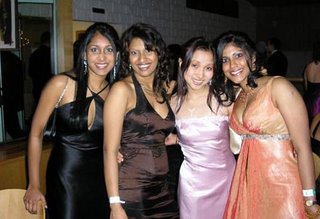Thursday, December 7, 2006
Wednesday, December 6, 2006
Putting the malaise into Malaysia

As the country approaches its 50th birthday, racial and religious tensions are jeopardising its economic and social success
UPROAR is still raging in Malaysia over inflammatory speeches at the annual congress of the ruling United Malays National Organisation (UMNO) in mid-November. One delegate talked of being ready to “bathe in blood” to defend the race and religion of the Malay Muslim majority against the ethnic Chinese and Indian minorities. The education minister, no less, brandished a keris (traditional dagger), only to be urged by another delegate to start using it. Its remarkable economic and social success is at risk from the increasingly separate lives its three main races are living.
Last weekend these anxieties were voiced by the crown prince of Perak, one of the country's constituent states. He recalled that in his boyhood the races mixed far more freely; nowadays most children go to single-race schools. The prince regretted that some Malay-majority schools have made girls wear headscarves and even told pupils to avoid non-Malays' homes. Malaysians' spirit of give-and-take, he lamented, had been replaced by the idea that progress was a zero-sum game among the races.
Apart from some deadly riots in 1969, the country has so far done remarkably well in handling the awkward racial mix it inherited when the Malaysian peninsula gained independence from Britain in 1957. The Chinese, now around a quarter of the population, arrived in colonial times to work the country's tin mines. The Indians, now around one-tenth, mainly came to work on plantations.
Neither group intended to stay forever but many did. The Malays' fears of being marginalised in their own land grew as the Chinese came to dominate business and the Indians the professions.
At independence, a “social contract” was struck in which the Indians and Chinese got citizenship while the indigenous peoples received privileged access to state jobs and education. After the 1969 riots, a far-reaching positive-discrimination policy was introduced, with the aim of increasing the indigenous groups' share of business ownership from just 4% to 30%.
Last year, foreign direct investment was worth only $4 billion, down from $4.6 billion in 2004. Despite having a big base in Malaysia, Intel is putting its new chipmaking plant in Vietnam. A key test of whether the government can boost investment, says Vince Leusner of the American Malaysian Chamber of Commerce, will be agreement on a free-trade pact it is negotiating with America. Concessions will be needed on such tricky issues as letting foreign firms bid for government contracts. To win greater access to the American market—Malaysia's largest—the prime minister, Abdullah Badawi, must brave the wrath of his UMNO backbenchers.
Nor Mohamed Yakcop, the deputy finance minister, points out that the government has a good record on delivering economic reforms—such as last year's loosening of the ringgit's peg to the dollar—despite political noise. But with Vietnam, China and India competing harder for investment, Malaysia has to build on its strengths as a relatively advanced, liberal country and seek more high-technology and creative businesses. Such businesses need talented people—and the widening ethnic and religious gap is encouraging a brain drain, says Azmi Sharom, a law lecturer at the University of Malaya.
Source
UPROAR is still raging in Malaysia over inflammatory speeches at the annual congress of the ruling United Malays National Organisation (UMNO) in mid-November. One delegate talked of being ready to “bathe in blood” to defend the race and religion of the Malay Muslim majority against the ethnic Chinese and Indian minorities. The education minister, no less, brandished a keris (traditional dagger), only to be urged by another delegate to start using it. Its remarkable economic and social success is at risk from the increasingly separate lives its three main races are living.
Last weekend these anxieties were voiced by the crown prince of Perak, one of the country's constituent states. He recalled that in his boyhood the races mixed far more freely; nowadays most children go to single-race schools. The prince regretted that some Malay-majority schools have made girls wear headscarves and even told pupils to avoid non-Malays' homes. Malaysians' spirit of give-and-take, he lamented, had been replaced by the idea that progress was a zero-sum game among the races.
Apart from some deadly riots in 1969, the country has so far done remarkably well in handling the awkward racial mix it inherited when the Malaysian peninsula gained independence from Britain in 1957. The Chinese, now around a quarter of the population, arrived in colonial times to work the country's tin mines. The Indians, now around one-tenth, mainly came to work on plantations.
Neither group intended to stay forever but many did. The Malays' fears of being marginalised in their own land grew as the Chinese came to dominate business and the Indians the professions.
At independence, a “social contract” was struck in which the Indians and Chinese got citizenship while the indigenous peoples received privileged access to state jobs and education. After the 1969 riots, a far-reaching positive-discrimination policy was introduced, with the aim of increasing the indigenous groups' share of business ownership from just 4% to 30%.
Last year, foreign direct investment was worth only $4 billion, down from $4.6 billion in 2004. Despite having a big base in Malaysia, Intel is putting its new chipmaking plant in Vietnam. A key test of whether the government can boost investment, says Vince Leusner of the American Malaysian Chamber of Commerce, will be agreement on a free-trade pact it is negotiating with America. Concessions will be needed on such tricky issues as letting foreign firms bid for government contracts. To win greater access to the American market—Malaysia's largest—the prime minister, Abdullah Badawi, must brave the wrath of his UMNO backbenchers.
Nor Mohamed Yakcop, the deputy finance minister, points out that the government has a good record on delivering economic reforms—such as last year's loosening of the ringgit's peg to the dollar—despite political noise. But with Vietnam, China and India competing harder for investment, Malaysia has to build on its strengths as a relatively advanced, liberal country and seek more high-technology and creative businesses. Such businesses need talented people—and the widening ethnic and religious gap is encouraging a brain drain, says Azmi Sharom, a law lecturer at the University of Malaya.
Source
Tuesday, November 28, 2006
Microsoft Loses S. Korea Patent Case
South Korea is again proving to be a thorn in Microsoft's side, as the company over the weekend lost a patent battle in the country concerning its Office software. The decision could force the Redmond company to halt sales of the popular productivity suite in South Korea.
The country's supreme court rejected attempts by Microsoft to have a patent surrounding technology to automatically switch input modes between Korea and English thrown out. The patent had been awarded to Lee Keung-Hae, a Hankuk Aviation University professor, in 1997.
Lawyers representing Lee are asking for copies of Office software with the technology to be pulled from store shelves, and feel that the decision strengthens their fight to win monetary damages, which they estimate at 70 billion won ($75.11 million USD).
The country's supreme court rejected attempts by Microsoft to have a patent surrounding technology to automatically switch input modes between Korea and English thrown out. The patent had been awarded to Lee Keung-Hae, a Hankuk Aviation University professor, in 1997.
Lawyers representing Lee are asking for copies of Office software with the technology to be pulled from store shelves, and feel that the decision strengthens their fight to win monetary damages, which they estimate at 70 billion won ($75.11 million USD).
Friday, November 24, 2006
Friday, November 17, 2006
Mongolian model murder
A dishevelled and unshaven Abdul Razak Baginda showed no emotion as he was charged with abetting the gruesome murder of a Mongolian model. If he is found guilty, the prominent political analyst faces the death penalty.
Abdul Razak's wife, Mazlinda Mahzan was far more emotional.
She shouted: "My husband is an innocent man! Why do this to him, he's a good man. The police killed her."
She was only allowed back into the court after she had calmed down.
His 19-year-old daughter Rowena, hugged him and whispered: "Be strong, no matter what happens."
The victim, 28-year-old Mongolian model Altantuya Shaariibuu, is believed to have been shot twice and her body blown up with C4 explosives to hide the crime.
Two policemen — Chief Inspector Azilah Hadri and Constable Sirul Azhar Umar — were charged on Wednesday with the murder. The policemen, both part of an elite unit tasked with protecting VIPs in Malaysia, also face the death penalty if convicted.
Prosecutors have not said how Abdul Razak knew the policemen or what their motive was for killing the model.
Prime Minister Abdullah Ahmad Badawi had pledged a thorough investigation and the police chief had said there would be no cover up.
The murder of the model has gripped the nation. With talk of an affair, extortion, police involvement and a top analyst tied to the deputy prime minister, the case has all the ingredients of a salacious scandal and the media are making the best of it.
"It has the three Ss going for it: sensationalism, sex and scandal. The public likes to read (this kind) of news," said Mr M Krishnamoorthy, the chief reporter of Malaysia's largest-circulated English newspaper, The Star.
Newspaper and TV reporters have been chasing clues and lurid details to piece together the sordid tale of an alleged extramarital affair gone sour.
On the political front, Foreign Minister Syed Hamid Albar yesterday assured the Bangkok-based Mongolian ambassador Yachii Bauuri that the rule of law will take its course in the investigation.
Meanwhile, Ms Shaariibuu's father, uncle and cousin held a prayer ceremony yesterday at the site where her remains were discovered. — AP, with additional reporting by fawziah selamat
Abdul Razak charged with abetting in model's murder
Source
Abdul Razak's wife, Mazlinda Mahzan was far more emotional.
She shouted: "My husband is an innocent man! Why do this to him, he's a good man. The police killed her."
She was only allowed back into the court after she had calmed down.
His 19-year-old daughter Rowena, hugged him and whispered: "Be strong, no matter what happens."
The victim, 28-year-old Mongolian model Altantuya Shaariibuu, is believed to have been shot twice and her body blown up with C4 explosives to hide the crime.
Two policemen — Chief Inspector Azilah Hadri and Constable Sirul Azhar Umar — were charged on Wednesday with the murder. The policemen, both part of an elite unit tasked with protecting VIPs in Malaysia, also face the death penalty if convicted.
Prosecutors have not said how Abdul Razak knew the policemen or what their motive was for killing the model.
Prime Minister Abdullah Ahmad Badawi had pledged a thorough investigation and the police chief had said there would be no cover up.
The murder of the model has gripped the nation. With talk of an affair, extortion, police involvement and a top analyst tied to the deputy prime minister, the case has all the ingredients of a salacious scandal and the media are making the best of it.
"It has the three Ss going for it: sensationalism, sex and scandal. The public likes to read (this kind) of news," said Mr M Krishnamoorthy, the chief reporter of Malaysia's largest-circulated English newspaper, The Star.
Newspaper and TV reporters have been chasing clues and lurid details to piece together the sordid tale of an alleged extramarital affair gone sour.
On the political front, Foreign Minister Syed Hamid Albar yesterday assured the Bangkok-based Mongolian ambassador Yachii Bauuri that the rule of law will take its course in the investigation.
Meanwhile, Ms Shaariibuu's father, uncle and cousin held a prayer ceremony yesterday at the site where her remains were discovered. — AP, with additional reporting by fawziah selamat
Abdul Razak charged with abetting in model's murder
Source
Subscribe to:
Comments (Atom)














